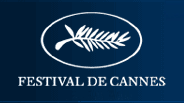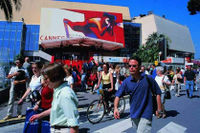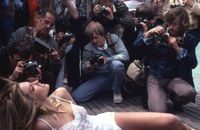
The Cannes Film Festival (French: le Festival international du film de Cannes or simply le Festival de Cannes), founded in 1939, is the world's most prestigious film festival. The festival is held annually in the resort town of Cannes, in the south of France.
Contents |
History
 The "Palais des Festivals" (2000)
The "Palais des Festivals" (2000)
At the end of the year 1930, shocked by the interference of the fascist governments of Germany and Italy in the selection of films for Mostra de Venise, Jean Zay, the French Minister of National Education, decided, on the proposal of Philippe Erlanger, to create an international cinematographic festival in Cannes. In June 1939, Louis Lumière agreed to be the president of the first festival, set to begin on September 1, 1939. The declaration of war against Germany by France and the United Kingdom on September 3, 1939, however, postponed the festival's premiere.
The festival was relaunched in 1946 and held from September 20, 1946 to October 5, 1946 in the old casino in Cannes.
The festival wasn't held in 1948 or 1950 on account of budgetary problems. In 1949 the Palais des Festivals was inaugurated. The original Palais was replaced by a new one in 1983.
The 1968 festival was halted on May 19, 1968. The day before, Louis Malle (president of the jury), François Truffaut, Claude Berri, Jean-Gabriel Albicocco, Claude Lelouch, Roman Polański and Jean-Luc Godard took over the large room of the Palais and interrupted the projection of film in solidarity with students and labor on strike throughout France.
The 59th Cannes Film Festival was held from May 17, 2006 to May 28, 2006. The famous Hong Kong director, Wong Kar-Wai, was the president of the jury for feature films. He was also the first Chinese president in the Festival's history. Wong Kar-Wai won the Best Director award in 1997 for the film Happy Together.
Impact
The festival has become an important showcase for European films. Jill Forbes and Sarah Street argue in European Cinema: An Introduction, that Cannes "became...extremely important for critical and commercial interests and for European attempts to sell films on the basis of their artistic quality" (page 20).[1] Forbes and Street also point out that, along with other festivals such as Venice and Berlin, Cannes offers an opportunity to determine a particular country's image of its cinema and generally foster the notion that European cinema is "art" cinema.[1]
Additionally, given massive media exposure, the non-public festival is attended by many movie stars and is a popular venue for movie producers to launch their new films and attempt to sell their works to the distributors who come from all over the globe.
Awards
The most prestigious award given out at Cannes is the Palme d'Or ("Golden Palm") for the best film. The jury of the festival, made of a small international selection of movie professionals, grants other awards, including the Grand Prix ("Grand Prize") — the second most prestigious award. No film can receive more than one award, however one award from the list may be awarded jointly to more than one movie, with the exception of the Palme d'Or.
Feature films
- Palme d'Or
- Grand Prix
- Prix de la mise en scène
- Prix du Jury
- Caméra d'Or
- Prix du scénario
- Prix d'interprétation féminine du Festival de Cannes
- Prix d'interprétation masculine du Festival de Cannes
- Prix un certain regard
Short films
- Palme d'Or du Festival de Cannes - court métrage
- Prix du Jury - court métrage
Cannes portrayed on film
 Starlets posing for photographers are a part of
Cannes folklore.
Starlets posing for photographers are a part of
Cannes folklore.
Evening in Byzantium (1978). The film festival is overtaken by terrorists. Directed by Jerry London and starring Glenn Ford and Eddie Albert. From a novel by Irwin Shaw.
Almost Perfect Affair (1979). A romantic comedy about an affair between a filmmaker and a producer's wife, set during the film festival. Starring Keith Carradine.
La Cité de la peur (1994). Comedy. Directed by Alain Berberian. Starring Alain Chabat, Chantal Lauby, Gérard Darmon.
Grosse Fatigue (1994). Comedy.
Festival in Cannes (2001). Entertainment industry farce about filmmakers trying to make deals during the Cannes Film Festival. Directed by Henry Jaglom and starring Greta Scacchi, Maximilian Schell and Ron Silver.
Femme Fatale (2002). After pulling off a risky heist during the Cannes Film Festival, Laure double-crosses her partners and tries to disappear by assuming the identity of a dead woman. Directed by Brian De Palma and starring Rebecca Romijn and Antonio Banderas.
References
- ^ a b Forbes, Jill; Street, Sarah (2001). European Cinema: An Introduction. London: Palgrave Macmillan. ISBN 0333752104.
External links
- Official sites
- Other sites
- Cannes - A Festival Virgin's Guide — resources and information for festival attendees.
- The Cannes Film Festival Blog
- Cannes Film Festival: A Potted History
- Cannes Film Festival — historical timeline
- Pictorial guide to Cannes and the French Riviera




 216.73.216.133
216.73.216.133 User Stats:
User Stats:
 Today: 0
Today: 0 Yesterday: 0
Yesterday: 0 This Month: 0
This Month: 0 This Year: 0
This Year: 0 Total Users: 117
Total Users: 117 New Members:
New Members:
 216.73.xxx.xxx
216.73.xxx.xxx
 Server Time:
Server Time: